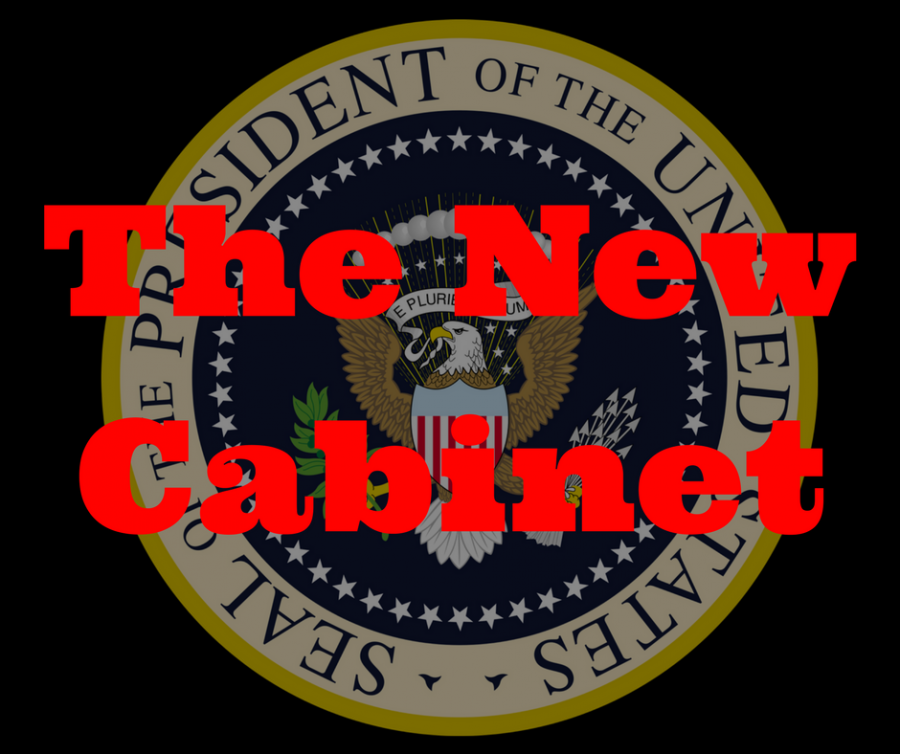New administration, new Cabinet – here’s how it’s shaping up
An overview of the Trump Administration Cabinet.
Established in Article II, Section 2 of the US Constitution, the Cabinet’s role is to advise the President on any subject he may require relating to the duties of each member’s respective office.
The Cabinet includes the Vice President and the heads of 15 executive departments: the Secretaries of Agriculture, Commerce, Defense, Education, Energy, Health and Human Services, Homeland Security, Housing and Urban Development, Interior, Labor, State, Transportation, Treasury, and Veterans Affairs, as well as the Attorney General.
Going forward, the Cabinet will be the President’s chief advisors. As such, their nominations are subject to senatorial approval. Confirmation hearings for each of the nominees took place before their respective senate subcommittee.
The members of the new administration’s Cabinet will advise the President and help shape the country over the next four years. Here’s how the cabinet stands as of now.
Secretary of State – Rex Tillerson. The State Department advises the President and leads the country in foreign policy issues. As the Secretary of State, Tillerson will be the chief diplomat of the United States and will advise the President on foreign policy decisions. Tillerson previously served as the Chief Executive of international oil and gas company Exxon Mobile. As Chief Executive of Exxon Mobile, Tillerson dealt and formed relationships with a plethora of foreign nations.
Secretary of the Treasury – Steven Mnuchin. The Secretary of the Treasury is the principal economic advisor to the President and plays a critical role in policy-making by bringing an economic and government financial policy perspective to issues facing the government. The Secretary is responsible for formulating and recommending domestic and international financial, economic, and tax policy, participating in the formulation of broad fiscal policies that have general significance for the economy, and managing the public debt. Prior to being named Secretary, Mnuchin worked for investment bank Goldman Sachs, eventually becoming Chief Information Officer. After leaving Goldman Sachs, Mnuchin worked for and founded several hedge funds.
Secretary of Defense – James Mattis. The Secretary of Defense serves as the head of the Department of Defense and advises the President on matters of national defense. Though the President holds control of the armed forces, it is impractical for Congress or the President to participate in every piece of Department of Defense affairs. Thus, the Secretary of Defense, and the Secretary’s subordinate officials, generally exercise military authority.
Attorney General – Jeff Sessions. As the chief officer of the Department of Justice, the attorney general enforces federal laws, provides legal counsel in federal cases, interprets the laws that govern executive departments, heads federal jails and penal institutions, and examines alleged violations of federal laws. In addition, the Attorney General may be called upon to represent the United States in the Supreme Court in cases of exceptional importance. Sessions previously served as the junior United States Senator from Alabama from 1997 until 2017. From 1981 to 1993, he served as US Attorney for the Southern District of Alabama. Sessions was nominated in 1986 to be a judge of the US District Court for the Southern District of Alabama, but his nomination failed due to criticism of his record on civil rights, as well as allegations that he had made racially insensitive remarks. Sessions was elected Attorney General of Alabama in 1994 and served for two years.
Secretary of Health and Human Services – Tom Price. The duties of this position revolve around human conditions and concerns in the United States. This includes advising the President on matters of health, welfare, and income security programs. Price previously served as the US Representative for Georgia’s 6th congressional district from 2005 until his resignation in 2017. Price served as chairman of the House Budget Committee and had previously served as chairman of the Republican Study Committee and the Republican Policy Committee.
Secretary of Transportation – Elaine Chao. The Secretary of Transportation oversees 11 agencies, including the Federal Aviation Administration, the Federal Highway Administration, and the National Highway Traffic Safety Administration. Chao previously served as Secretary of Transportation under George W. Bush.
Secretary of Education – Betsy DeVos. By far one of the most controversial cabinet nominees for the new administration. The Secretary deals with federal influence over education policy, and heads the US Department of Education. The Secretary is advised by the National Advisory Committee on Institutional Quality and Integrity. DeVos faced intense opposition for her nomination. After an underwhelming confirmation hearing in which Ms. DeVos seemed ignorant of major provisions of federal education law, such as the Individuals With Disabilities Education Act, some Senate offices reported receiving more calls opposing Ms. DeVos than any other Trump nominee. DeVos is the only Cabinet nominee, thus far, who has faced opposition from members of the Republican Party.
Secretary of Homeland Security – John F. Kelley. The Department of Homeland Security is the newest major department in the United States government, created after the 9/11 attacks. The department consists primarily of components transferred from other cabinet departments because of their role in homeland security, such as the Coast Guard, the Federal Protective Service, US Customs and Border Protection, US Immigration and Customs Enforcement, the Secret Service, and the Federal Emergency Management Agency (FEMA). Kelley previously served as he is a United States Marine Corps General, the former Commander of United States Southern Command, the Commanding General of the Multi-National Force—West in Iraq, the Commander of Marine Forces Reserve, and Marine Forces North.
CIA Director – Mike Pompeo. The CIA Director acts as the principal adviser to the President for intelligence matters related to the national security, and serve as head of the Central Intelligence Agency. The representative from Kansas and former Army officer would have to decide whether to undo a new C.I.A. “modernization” plan, and how to proceed if the President orders a resumption of harsh interrogation tactics for terrorism suspects.
UN Ambassador – Nikki Haley. The U.S. Permanent Representative is charged with representing the United States on the UN Security Council and during almost all plenary meetings of the General Assembly, except in the rare situation in which a more senior officer of the United States (such as the U.S. Secretary of State or the President of the United States) is present.
EPA Administrator – Scott Pruitt. The EPA Administrator is responsible for enforcing the nation’s Clean Air and Clean Water Acts, as well as numerous other environmental statutes. The agency conducts environmental assessment, research, and education. It has the responsibility of maintaining and enforcing national standards under a variety of environmental laws, in consultation with state, tribal, and local governments. It delegates some permitting, monitoring, and enforcement responsibility to U.S. states and the federally recognized tribes. EPA enforcement powers include fines, sanctions, and other measures. The agency also works with industries and all levels of government in a wide variety of voluntary pollution prevention programs and energy conservation efforts. In 2010 Pruitt was elected Attorney General of Oklahoma. In that role, he was viewed as a proponent of federalism, supporting religious freedom laws and fought against abortion rights, same-sex marriage, the Affordable Care Act, and environmental regulations as a self-described “leading advocate against the EPA’s activist agenda.”
The remaining Cabinet positions have yet to be approved by the Senate. In addition to the official Cabinet positions, the President also appoints several other advisors who aid the President in the day-to-day functioning of the Executive Branch. These advisors, while technically having less administrative power, are still key components to the running of the country. Among these positions are the White House Chief of Staff, the Director of National Intelligence, the White House Chief Strategist, National Security Advisor, White House Counsel, Executive Counselor, and the White House Press Secretary.
White House Chief of Staff – Reince Priebus. The duties of the White House Chief of Staff vary greatly from one administration to another, and in fact, there is no legal requirement that the president even fill the position. However, since at least 1979, all presidents have found the need for a Chief of Staff, who typically oversees the actions of the White House staff, manages the President’s schedule, and decides who is allowed to meet with the President. Because of these duties, the Chief of Staff has at various times been labeled “The Gatekeeper.” The departing Chairman of the Republican National Committee is known as a dealmaker and is close with the House Speaker, Paul D. Ryan. His role will be key in a White House run by Mr. Trump, who has no experience in making policy.
Director of National Intelligence – Dan Coates. The Director of National Intelligence (DNI) serves as the top intelligence official in the United States government. The DNI oversees what is known as the Intelligence Community, which consists of more than a dozen civilian and military agencies that collect information on threats against the United States. Mr. Coats served on the Senate intelligence and armed services committees while representing Indiana. Some in Mr. Trump’s orbit believe that the job, overseeing the entire military and civilian intelligence apparatus, is superfluous.
White House Chief Strategist – Stephen Bannon. The position of Chief Strategist is newly created with the Trump administration and as such the specific duties which Mr. Bannon will perform are, as of yet, largely unknown. Mr. Bannon is a right-wing media executive who has been criticized as representing racist views as the former head of Breitbart News. Mr. Trump said that he would be “working as equal partners” with Mr. Priebus, the incoming Chief of Staff.
National Security Advisor – H.R. McMaster. The National Security Advisor plays a critical role in administration of the National Security Council (NSC), which advises and assists the President on national security and foreign policy issues. In the short period of time in which the Trump administration has been in office, the National Security Advisor has already been replaced. The position was originally held by Michael Flynn, a retired Army lieutenant general who resigned the post after it was revealed he had misled Vice President Mike Pence and other top White House officials about his conversations with the Russian ambassador to the United States. He held the position for less than a month. Flynn was replaced by General H. R. McMaster. General McMaster is seen as one of the Army’s leading intellectuals. As a commander, he was credited with demonstrating how a different counterterrorism strategy could defeat insurgents in Iraq.
White House Counsel – Donald F. McGahn II. The White House Counsel is a staff appointee of the President of the United States whose role is to advise the President on all legal issues concerning the President and his administration. McGahn is an American campaign finance lawyer, and a former Commissioner of the United States Federal Election Commission. McGahn was chief counsel for the National Republican Congressional Committee from 1999 to 2008. He was nominated to the Federal Election Commission in 2008 by George W. Bush and served in that role until 2013.
Executive Counselor – Kellyanne Conway. The Counselor to the President is a high-ranking assistant to the President of the United States, and a senior member of the Executive Office of the President. The Counselor to the President is responsible for assisting the President and White House Chief of Staff with the day-to-day management of White House staff operations. Conway previously served as Mr. Trump’s campaign manager, confidante and spokeswoman. Conway also has a background in polling and may rely on these skills to keep tabs on public sentiment as she helps set the president’s agenda.
White House Press Secretary – Sean Spicer. The White House Press Secretary is a senior White House official whose primary responsibility is to act as spokesperson for the executive branch of the United States government administration, especially with regard to the President, senior executives, and policies. The Press Secretary is responsible for collecting information about actions and events within the president’s administration and issues the administration’s reactions to developments around the world. The press secretary interacts with the media, and deals with the White House press corps on a daily basis, generally in a daily press briefing. Spicer previously served as the longtime spokesman for the Republican National Committee and top aide to former RNC Chairman Reince Priebus. Spicer will be the face of the White House, framing messaging, responding to stories of the day and briefing the press.

BPHS senior Greydon Tomkowitz is the current Editor-In-Chief of Hawk Eye, a position he has served in for three years.
Greydon joined the newspaper...












